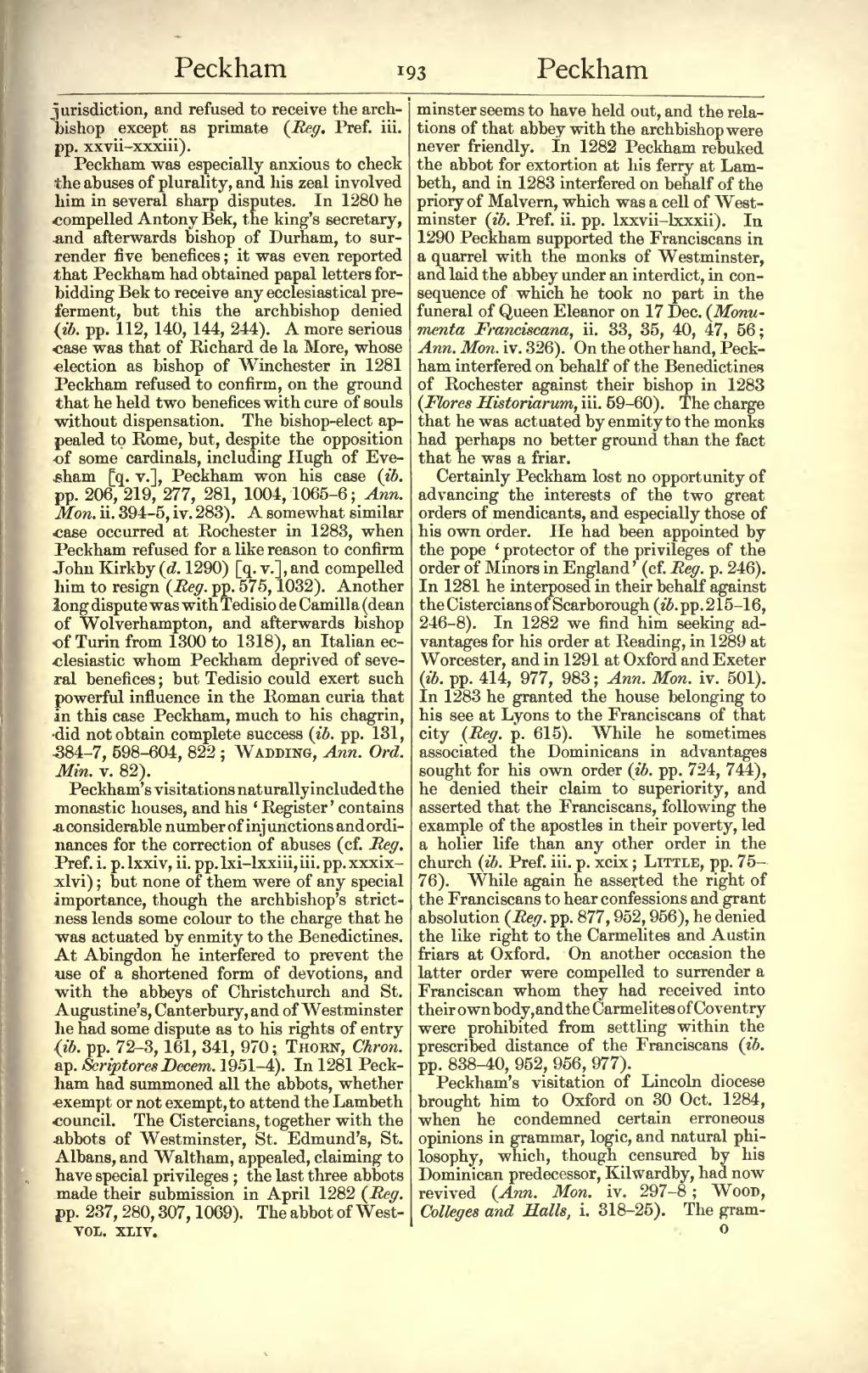jurisdiction, and refused to receive the archbishop except as primate (Reg. Pref. iii. pp. xxvii–xxxiii).
Peckham was especially anxious to check the abuses of plurality, and his zeal involved him in several sharp disputes. In 1280 he compelled Antony Bek, the king's secretary, and afterwards bishop of Durham, to surrender five benefices; it was even reported that Peckham had obtained papal letters forbidding Bek to receive any ecclesiastical preferment, but this the archbishop denied (ib. pp. 112, 140, 144, 244). A more serious case was that of Richard de la More, whose election as bishop of Winchester in 1281 Peckham refused to confirm, on the ground that he held two benefices with cure of souls without dispensation. The bishop-elect appealed to Rome, but, despite the opposition of some cardinals, including Hugh of Evesham [q. v.], Peckham won his case (ib. pp. 206, 219, 277, 281, 1004, 1065–6; Ann. Mon. ii. 394–5, iv. 283). A somewhat similar case occurred at Rochester in 1283, when Peckham refused for a like reason to confirm John Kirkby (d. 1290) [q. v.], and compelled him to resign (Reg. pp. 575, 1032). Another long dispute was with Tedisio de Camilla (dean of Wolverhampton, and afterwards bishop of Turin from 1300 to 1318), an Italian ecclesiastic whom Peckham deprived of several benefices; but Tedisio could exert such powerful influence in the Roman curia that in this case Peckham, much to his chagrin, did not obtain complete success (ib. pp. 131, 384–7, 598–604, 822; Wadding, Ann. Ord. Min. v. 82).
Peckham's visitations naturally included the monastic houses, and his ‘Register’ contains a considerable number of injunctions and ordinances for the correction of abuses (cf. Reg. Pref. i. p. lxxiv, ii. pp. lxi–lxxiii, iii. pp. xxxix–xlvi); but none of them were of any special importance, though the archbishop's strictness lends some colour to the charge that he was actuated by enmity to the Benedictines. At Abingdon he interfered to prevent the use of a shortened form of devotions, and with the abbeys of Christchurch and St. Augustine's, Canterbury, and of Westminster he had some dispute as to his rights of entry (ib. pp. 72–3, 161, 341, 970; Thorn, Chron. ap. Scriptores Decem. 1951–4). In 1281 Peckham had summoned all the abbots, whether exempt or not exempt, to attend the Lambeth council. The Cistercians, together with the abbots of Westminster, St. Edmund's, St. Albans, and Waltham, appealed, claiming to have special privileges; the last three abbots made their submission in April 1282 (Reg. pp. 237, 280, 307, 1069). The abbot of Westminster seems to have held out, and the relations of that abbey with the archbishop were never friendly. In 1282 Peckham rebuked the abbot for extortion at his ferry at Lambeth, and in 1283 interfered on behalf of the priory of Malvern, which was a cell of Westminster (ib. Pref. ii. pp. lxxvii–lxxxii). In 1290 Peckham supported the Franciscans in a quarrel with the monks of Westminster, and laid the abbey under an interdict, in consequence of which he took no part in the funeral of Queen Eleanor on 17 Dec. (Monumenta Franciscana, ii. 33, 35, 40, 47, 56; Ann. Mon. iv. 326). On the other hand, Peckham interfered on behalf of the Benedictines of Rochester against their bishop in 1283 (Flores Historiarum, iii. 59–60). The charge that he was actuated by enmity to the monks had perhaps no better ground than the fact that he was a friar.
Certainly Peckham lost no opportunity of advancing the interests of the two great orders of mendicants, and especially those of his own order. He had been appointed by the pope ‘protector of the privileges of the order of Minors in England’ (cf. Reg. p. 246). In 1281 he interposed in their behalf against the Cistercians of Scarborough (ib. pp. 215–16, 246–8). In 1282 we find him seeking advantages for his order at Reading, in 1289 at Worcester, and in 1291 at Oxford and Exeter (ib. pp. 414, 977, 983; Ann. Mon. iv. 501). In 1283 he granted the house belonging to his see at Lyons to the Franciscans of that city (Reg. p. 615). While he sometimes associated the Dominicans in advantages sought for his own order (ib. pp. 724, 744), he denied their claim to superiority, and asserted that the Franciscans, following the example of the apostles in their poverty, led a holier life than any other order in the church (ib. Pref. iii. p. xcix; Little, pp. 75–76). While again he asserted the right of the Franciscans to hear confessions and grant absolution (Reg. pp. 877, 952, 956), he denied the like right to the Carmelites and Austin friars at Oxford. On another occasion the latter order were compelled to surrender a Franciscan whom they had received into their own body, and the Carmelites of Coventry were prohibited from settling within the prescribed distance of the Franciscans (ib. pp. 838–40, 952, 956, 977).
Peckham's visitation of Lincoln diocese brought him to Oxford on 30 Oct. 1284, when he condemned certain erroneous opinions in grammar, logic, and natural philosophy, which, though censured by his Dominican predecessor, Kilwardby, had now revived (Ann. Mon. iv. 297–8; Wood, Colleges and Halls, i. 318–25). The gram-
